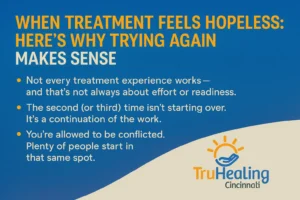“I already tried. Why would this be any different?”
That’s what one man said when his sister called about our program in Cincinnati. He had done detox, outpatient, and even a month in a residential center two years ago. He went because he was supposed to. He showed up. Did the work. Didn’t drink for a while.
Then he relapsed. Quietly. At first, it was a few beers to manage anxiety. But within six months, it was back to hiding bottles and canceling plans. The part he didn’t say out loud?
“I think I’m broken. Not even treatment helped.”
He’s not the only one.
At TruHealing Cincinnati, we’ve met so many people who’ve felt this way. This blog isn’t here to convince you with buzzwords or bright promises. It’s here to speak to the voice in your head that says, “I want to believe it could be different… but I’m scared it won’t be.”
When “Treatment” Feels Like a Letdown
Let’s name it: not every treatment experience works. And that’s not always about effort or readiness.
You might’ve walked into a program that focused only on abstinence—not on what made drinking feel necessary in the first place.
You might’ve been surrounded by people you couldn’t relate to, or sat in group therapy feeling like a fraud.
Maybe it felt more like being managed than understood.
We’ve heard it all before:
- “They told me what to do but didn’t ask what I needed.”
- “They focused on my alcohol use but ignored my anxiety and trauma.”
- “I felt like a number, not a person.”
When that’s your experience, of course you’re hesitant to try again.
But here’s the truth: treatment can be different. The way it’s delivered matters. The people in the room matter. And most importantly—you matter. You’re not a failed client. You just haven’t been met in the right way yet.
The Second (or Third) Time Isn’t Starting Over
You’ve been through enough to know what didn’t work. That’s not nothing—that’s wisdom.
Coming back to treatment now doesn’t erase what you’ve already done. If anything, it’s a continuation of the work. This time, you might ask for different things. You might set boundaries with your provider. You might speak up earlier or sit silently longer. All of that is valid.
One client who returned to us after a rough relapse said,
“I didn’t want to raise my hand this time. I just wanted to observe and feel like myself again. And they let me do that.”
That’s how healing started—not with a big commitment, but a small moment of autonomy.
What We Do Differently at TruHealing Cincinnati
We meet you where you are—not where we wish you were.
That means:
- Real flexibility in how and when you engage with care
- Integrated mental health support for anxiety, trauma, or depression
- Staff who listen first, talk second
- No pressure to perform “perfect recovery”
- Personalized treatment plans that adapt as you do
We work with many clients who’ve been through programs before—some more than once. We don’t judge you for coming back. We honor it.
We also offer nearby options like alcohol addiction treatment in Lawrenceburg or Lexington, Kentucky if that feels easier geographically.
What If You’re Not Even Sure You Want to Stop?
You’re allowed to be conflicted. Plenty of people walk into our program thinking:
- “I just want to cut back.”
- “I don’t know if I’m an alcoholic.”
- “I’m just here because my partner gave me an ultimatum.”
Here’s the thing: you don’t have to adopt a label or commit to lifelong sobriety on day one.
You just have to show up with some curiosity—and let us help you explore the rest.
Some of our strongest recoveries started from ambivalence. It doesn’t disqualify you. It just makes you human.

What Progress Looks Like When You’re Skeptical
You might not come in feeling hopeful. That’s okay.
Instead of hope, think possibility.
Progress might look like:
- Being honest in therapy—even once
- Making it to a full week of sessions
- Taking medication for anxiety after years of white-knuckling
- Saying “I don’t know” instead of pretending you’re fine
- Trusting someone again, just a little
Recovery doesn’t have to look like dramatic breakthroughs. It can look like showing up with your guard still halfway up—and being met with respect anyway.
Real Stories from People Who Thought Treatment “Didn’t Work”
We’ve worked with people who:
- Failed drug tests in their first week
- Left treatment early, then came back
- Didn’t speak in group for three weeks
- Were deeply skeptical, resentful, or totally burned out on recovery culture
And we’ve watched them reconnect with parts of themselves they thought were gone.
One woman told us,
“I wasn’t excited to come back. But this time, I didn’t fake it. I told the truth, and they didn’t flinch.”
Another shared,
“I thought being here again meant I’d failed. But it turned out I just hadn’t found the right fit yet.”
Your story doesn’t need to be neat. It just needs room to keep going.
FAQ: Treatment Skeptic Edition
I’ve already done treatment. What makes this different?
At TruHealing, we focus on individualized care—especially for clients who’ve been through programs before. We don’t recycle a standard curriculum. We ask what you’ve tried, what you need, and what’s still missing. Then we build around that.
What if I’m not totally ready to quit drinking forever?
That’s okay. We’ll help you unpack what drinking does for you, what it costs, and how to make decisions that actually serve you. Readiness can evolve during treatment. You don’t have to declare it at the door.
Do I have to do 12-step?
Not unless you want to. We offer 12-step options, but we also integrate non-12-step approaches including trauma-informed care, CBT, DBT, and mental health support for co-occurring disorders.
How do I know I’m not just wasting time again?
There’s no guarantee. But if you leave a program feeling more known, more stable, and more supported—that’s not wasted. Even if it’s not your final stop, it’s a step toward something better.
Will people judge me for relapsing?
Not here. We expect that people come in with history, pain, and mistakes. That’s why we exist. The people in your group? Many of them have relapsed too. And they get it.
You Don’t Need to Be Sure—You Just Need to Be Willing
Trying again doesn’t mean pretending it never failed. It just means something in you is still alive enough to ask for more.
That part of you—the part still curious, still quietly hopeful—is worth listening to.
Ready to explore your next step?
Call (888) 643-9118 or visit our Alcohol Addiction Treatment page to learn how TruHealing Cincinnati helps people rebuild—without pretending the past didn’t happen. You don’t have to be sure. You just have to be open.

